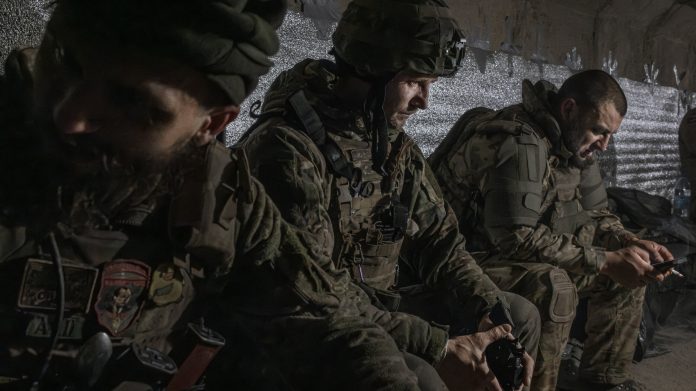Leaked documents reviewed by The Grayzone reveal British intelligence’s involvement in Ukraine’s failed attempt to seize Krynky. The operation was the brainchild of Project Alchemy, a covert British Ministry of Defence unit. Its aim was to keep Ukraine fighting, regardless of the cost. The operation led to significant loss of life and stands as one of the war’s biggest failures.
The operation and its flaws
On 30th October 2023, Ukrainian commandos crossed the Dnieper River in small boats, heading to Krynky, a village in Kherson that Russian forces had seized earlier. These troops had spent the previous two months training in terrain similar to Krynky’s, under the watchful eye of British generals. Both British and Ukrainian officials were confident the mission would turn the tide of the war, allowing Ukraine to march on Crimea.
However, the mission quickly became a disaster. The British-trained marines faced overwhelming fire from Russian artillery, drones, and mortars. They were heavily overloaded and ill-equipped. Without air cover, the operation turned into a bloodbath. The marines couldn’t resupply, and evacuation was impossible. The promised missile cover failed to materialise. Weeks later, it became evident that the operation was a catastrophic failure. Yet, for months, British-trained Ukrainian marines were repeatedly sent into the kill zone. The decision to continue the mission despite mounting losses has been widely regarded as a major strategic blunder. Many believe the British generals who planned the operation must be held accountable.
Project Alchemy’s role
Project Alchemy, a secret British Ministry of Defence unit, was central to the operation’s planning. Leaked documents show that the British not only trained the Ukrainian marines but also helped establish the “Maritime Raiding Force,” which was ultimately sacrificed at Krynky.
The idea for the Maritime Raiding Force came from a leaked British document dated June 2022. Project Alchemy proposed creating a force that would target Russian coastal defences along Crimea. This force would include high-speed boats, drones, and other specialised equipment designed to attack Russian ports and warships. The ultimate goal was to weaken Russian defences and pave the way for a larger assault on Sevastopol.
British influence on Ukraine’s marine corps
Initially, Ukraine’s leadership was reluctant to form a marine force focused on amphibious operations. However, after British officials met with Ukrainian commanders in early 2023, they convinced them to establish a Marine Corps. By May 2023, almost 1,000 Ukrainian marines had completed training in the UK for small boat operations, including beach raids.
The training took place across several locations in the UK, including remote camps in Scotland. The marines practised night-time operations. However, despite this rigorous preparation, the operation at Krynky exposed major flaws in planning and execution.
The Krynky disaster
As soon as Ukrainian marines arrived at Krynky, they encountered serious difficulties. The mission’s planning quickly proved to be a liability. The troops faced constant enemy fire, and many boats were sunk, leaving marines stranded in the water. The operation’s logistics were also deeply flawed. Troops had to carry all necessary supplies with them, but the terrain and conditions hadn’t been accounted for.
One marine recalled: “We had to carry everything—generators, fuel, food—but we hadn’t planned for the area. We expected the Russians to retreat, but they were waiting for us.” The lack of supplies led to some marines using car tyres to float back to safety. Meanwhile, Russian forces launched relentless artillery and drone attacks, pushing Ukrainian forces to retreat.
Consequences and accountability
As the situation at Krynky worsened, many marines began to refuse orders, recognising that continuing the operation would be suicidal. Nevertheless, the mission continued for months. By the spring of 2024, Ukrainian forces had to withdraw. The operation had become a disaster, with many marines losing their lives unnecessarily.
The British Ministry of Defence’s involvement in the planning of this operation is now under intense scrutiny. Despite the enormous loss of life, no one in the British military has faced any consequences. The failure at Krynky has become one of the clearest examples of poor military strategy in the war.
